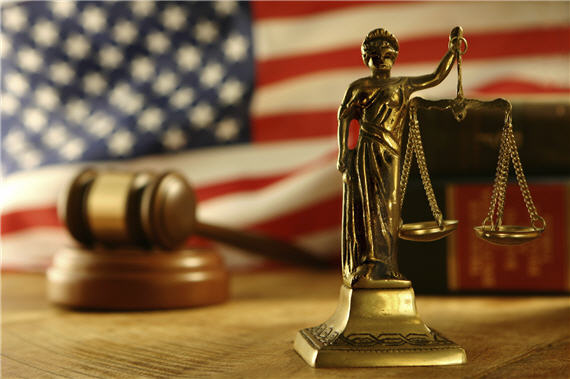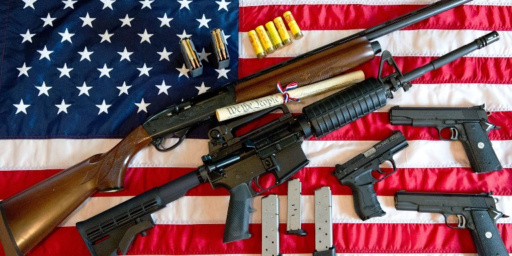Special Prosecutors For Police-Involved Shootings?
Removing the responsibility to investigate police misconduct from the prosecutors who have to work with those police on a daily basis is a good idea.
The Washington Post’s Jannell Ross raises a suggestion that has been made several times over the course of the year that has elapsed since the deaths of Eric Garner and Michael Brown, namely that the investigation and potential prosecution of incidents involving alleged police abuse should be handled by someone other than the local prosecutor:
Time and time again — after unarmed black individuals died in police custody, or were shot and killed by police — in New York, in Missouri, in South Carolina, and from police themselves in Baltimore, the answer has been the same: A special prosecutor, someone with no day-to-day connections to local police, state’s attorneys or even the community itself, should be appointed to investigate fatal police shootings involving unarmed suspects and situations where people die an unnatural death in jail or prison.
That’s been the standard response. Now, some say it’s time to go off-script.
Earlier this month, New York Gov. Andrew Cuomo (D) announced that New York’s attorney general will begin serving as a special prosecutor leading investigations, and sometimes grand jury inquires, into fatal police shootings.
In December, a piece by Joshua Deahl, an appellate attorney in the Washington,D.C. Public Defender Service published at Bloomberg View, the opinion arm of Bloomberg News, called on states to stand up permanent special prosecutor’s offices housed inside the offices of state attorneys general. These teams, Deahl argued could investigate police-involved cases without the appearance of impropriety and possible conflicts of interest that dog cases where local police and prosecutors investigate one or more of their own. Deahl also claimed that such a set up would reduce the cost of quick putting together and pulling apart temporary special prosecutors offices and the risk that someone with too many connections to locals and possible conflicts will get the job.
And in October, a bipartisan pair of Missouri legislators said they planned tointroduce a bill calling for all investigations of fatal police shootings and other deaths in police custody to be turned over to a special prosecutor.
This isn’t a very dissimilar proposal from one that I wrote about back in December when the news about Govvernor Cuomo’s decision to shift investigation of some police-involved shootings to the State Attorney General was first announced. This announcement, of course, came in the wake of the decision by a Staten Island Grand Jury to decline to indict the officers involved in the incident that led to the choking death of Eric Garner last July. That decision came mere weeks after the announcement that former Ferguson Police Office Darren Wilson would not be indicted in the death of Michael Brown, and set off a series of nationwide protests that lasted for the better part of the month of December. At the same time as that announcement, several legal experts also argued in favor of the idea of separating the investigation and prosecution of police from the prosecutors who, because of their jobs, are required to work with the local police department on a regular basis. Paul Butler, who served as a Federal Prosecutor before becoming a Law Professor at George Washington University, for example, argued that the culture of a prosecutors office requires developing the kind of relationship with the local police that makes it difficult to objectively prosecute controversial cases involving the police department. If a prosecutor is faced with the choice between seeking justice and maintaining the kind of relationship with police that they need in order to do their job, their decision have the potential to be tainted. The Volokh Conspiracy’s Paul Cassell made similar observations, and argued in favor of shifting the responsibility for investigation of police-involved incidents to State’s Attorneys General, whose offices don’t necessarily require a working relationship with local police. As I argued at the time, whether one frames the argument in terms of a new “special prosecutor” or simply the shifting of responsibility for certain cases to the Attorney General, it seems wise to remove the potential of local prejudices and pressures from what should be a decision based solely on the evidence available.
Jazz Shaw notes two objections to this idea:
First, even the highest estimates only put the number of police shootings at around 400 per year on average. That would work out to roughly 8 per year in each state. (Understanding that some will have vastly more and some almost none.) As already noted, more than half of them will probably be white suspects, so there’s no need to investigate those. The details from the same report indicate that the vast majority are not even worth an investigation because they are shootings of armed suspects who were shooting at the police or civilians and there’s no question as to whether or not the shooting was justified. When you’re finished taking all of those out you’ve probably got a couple of dozen per year which are questionable enough to warrant such an investigation, but just to be generous, let’s bump it up to fifty. That’s one per state. Per year. What will these offices do the rest of the time to earn their pay?
Perhaps more importantly, who will staff these offices? Where are you going to find these prosecutors and investigators “with no day-to-day connections to local police, state’s attorneys or even the community itself?” Will they be assigned by elected officials? If so, which ones and how do you remove the immediate suspicion that there was bias in the selection process? Will they be elected by the people? That makes them politicians with their own motives to win the next election. No thank you. Will they even have any legal or law enforcement experience? Or will they just be someone willing to stick it to the man?
The answer to these questions, it seems to me, is that rather than creating an entirely new office solely devoted to investigating cases involving the police, which would seem to be rather wasteful given the number of cases that actually merit investigation in a given year, the responsibility for investigating these matters should be given the Attorney General’s in each state. With a few notable exceptions, these officers are headed by someone who is elected statewide or appointed by the Governor, so they are answerable to a statewide electorate rather than just the voters of a local jurisdiction. Additionally, their offices are subject to oversight by the legislature and, in some cases, the state’s Supreme Court so concerns about prosecutorial overreach could be addressed in these forums. Concerns about the cost of a new position can be largely dismissed since the offices of most Attorneys General are large enough to handle the occasional police investigation and the costs of expansion in hiring a few additional attorney or investigators would be minimal at best. In return for incurring these minimal costs, we would get the advantage of removing the questions about whether or not to prosecute an officer in a particular case from the prosecutors who have to work with those same police officers on a daily basis and thus might be biased against prosecution for fear of ruing their work relationship. It would also go a long way toward addressing the appearance of impropriety created by a police department being investigated by the same prosecutors that work with it on a regular basis, which has been one of the main criticisms of those who have been calling for greater public attention toward police abuse.
In the end, one of the biggest problems that has become apparent as the more stories about police misbehavior and excessive and inappropriate uses of force have become public is that there is a real sense of distrust about how criminal justice system handles these cases. To no small degree, of course, that is due to the racial issues involved, but a large part of the problem is the fact that there is a perception, justified by reality, that allegations of abuse and excessive force by police are not being investigated fully and fairly by prosecutors. Putting the duty to do those investigations in the hands of an authority with no potential loyalty or bias toward the police would go a long way toward addressing that concern.







Oh, … ONLY 400 per year? Then what’s all the fuss about?
/sarcasm
And why only focus on shootings? Plenty of police beatings to go around. Not to mention a smorgasbord of opportunity for corruption.
@PogueMahone: To be fair, it appears in the original article the author seems to be talking about all questions of police abuse, not just shootings. It was the critic trying to argue against the idea who narrowed it to shootings to make it appear that the number of incidents is small. Just misdirection, I think.
Refer all police shootings to the FBI for investigation. If the investigation yields anything they can turn their evidence over to the state AG or failing that, refer it to the federal prosecutor. 400 investigations will mean some extra agents, and some additional cost, but certainly less than the cost of this mistrust and confrontation.
@PogueMahone:
The washington post has been trying to keep a database of just police shootings. It will probably go over 1000 this year. http://www.washingtonpost.com/graphics/national/police-shootings/
Of course, if one takes the times to review the deaths, it goes against the narrative protrayed by the media.
@PogueMahone: Shaw attempts to minimize this by redefining police abuse as shootings only, then goes on to throw out half of them because they involve white suspects, and many more because they’re cut and dried. I don’t believe anyone’s proposed limiting this to shootings involving minority victims. And the cut and dried cases aren’t a reason to not handle them at the state level, they’re a reason the state should be able to handle them routinely and quickly.
However, I worry that while the state AG is one remove further from the local police, they are not removed enough to be unbiased, much less seen as unbiased.
There is a MAJOR problem with that statute of Lady Justice!
1) Jazz is, as noted above, under-counting the numbers.
2) There is no reason not to investigate shootings of whites. The problem isn’t just racial but also militarization of police in general.
3) No need to limit to shootings.
4) One concern about a State A.G. is that that is an elected position – and political payback from F.O.P. or other pro-police interest groups might be a factor.
@gVOR08:
Shootings are easy to define as being within the scope of any form of outside investigation because there was the discharge of a gun. But do you really want the FBI to show up every time someone claims that law enforcement used physical force against them. Then everyone arrested would claim to have been beaten in order to bring in the FBI.
That progressives cannot think about the unintended consequences of their policy proposals does not bode well for the future.
There should be committees set up that are made up of experienced police officers who have walked the talk, not sat behind some desk their whole careers. And no politicians and elected officials.
@superdestroyer:
Where does he even imply that? He is talking about deaths caused by police and those that occur while in police custody.
@Tyrell: Yeah…. That’ll solve extrajudicial killings by police.
@superdestroyer: The Guardian has it at 646 right now.
The prosecutors should be appointed by the Governor, and the ranks drawn from retired judges and retired lawyers who have no further political ambitions. As retirees, they may feel freer to listen to the law and their conscience because they no longer have to worry about keeping good relations with anyone on the various forces. Chances are that the people they worked with also are retired as well.
@superdestroyer:
I take your attempt at distraction to mean you were unable to come up with a rational reason why the FBI should not investigate every fatal police shooting.
The FBI is the logical agency to use. They have the skills and the distance from the local cops. And boy there is no better way to inform cops that they are being watched. My guess is the number of shootings will decline.
@CarolDuhart2: A more detailed proposal:
1) Retired judges and retired attorneys eligible after 5-7 years appointed for life or 10-year terms. Nobody that still has political ambitions would take the job, and perhaps you could also have the advantage of cooler heads as well. Judges that would qualify would at least be in late middle age and feel they have less to prove and less desire for wins for wins sake.
2) I would also include a special group of judges as well for the trials. Again, if these people have the same qualifications as the special Prosecutors, they could also be fearless in upholding justice as well.
There are also other benefits. Swifter justice-as these trials would not have to wait for an overcrowded docket with all of the issues of pretrial publicity and possible witness and juror intimidation. Cheaper-the appointees would be part-timers called when needed, or a special office with no other duties. Since they are retirees, they already have a source of income, so compensation would be reasonable.
@Tyrell:
You just can’t make this stuff up.
Do you also believe that rape cases should only be investigated by men, and that libel cases should only be investigated by tabloid journalists?
@DrDaveT:
I think Tyrell is proof positive that you can indeed make this stuff up.
@michael reynolds:
So why are the local prosecutors qualified to review non-lethal police shootings but not lethal shootings. The logic that the prosecutors are too close to law enforcement still applies. The same goes for beatings. Maybe the Justice Department should just review all arrest made by the local law enforcement to ensure that no one’s rights are violated.
Once again, when progressives pursue policy out of a sense of status seeking, they are not very good at thinking of all of the impacts.
@OzarkHillbilly:
In looking at the Guardian database, it includes deaths such as an individual struck by a police car while the pedestrian was crossing against the don’t walk sign. Do you really want the FBI to investigate traffic accidents involving law enforcement? Of course, if you want there to be much less law enforcement, it would make sense.
@DrDaveT: I should have added more qualifications and meant to say that any police on the committee should be those who have walked a beat and done the street work. And that the committee would not just be police, but also regular middle class working people: teachers, cooks, mechanics, construction workers, soldiers, coaches, janitors, nurses, electricians, and bartenders. Let’s let the regular people take a look at this instead of politicians, lawyers, and bureaucrats. The working class pays the taxes !!
Sorry for the error. It is hot out here. Hot, hot: 100+ every day. Enough to charbroil your head.
@Tyrell: Gosh, what an amazing idea! We could call that group of average citizens a “JURY”.
As for the heat? Move to FL. We’re 90* as a daily high, afternoon thunderstorms that cool things off (and chase my little boat off Tampa Bay) and a sea breeze 24/7.
Once someone has been killed, it’s a little late isn’t it?
I mean, sure, make sure that we have effective oversight when there are deaths, to make sure they are lawful, and that justice is served (which may well be validating the police action, as some shootings are justified, I assume). But, we should be making an effort to prevent the unlawful and the unprofessional shootings (that middle ground between unlawful and the week justified shootings)
We need to identify the police who don’t know how to deescalate stressful situations, and make sure they have the training they need to do their jobs well, and for those who can’t learn, ease them out before there is a tragedy.
Police work is a mixture of social work, therapist, and thug with a gun authorized by the community to impose order with the threat of violence (I mean that last part in the least offensive way possible). It’s a completely incongruent set of skills, and people are going to have trouble with it, and very few people are going to do all aspects well without a lot of training.
As an aside, I would find it incredibly hard to convict a policeman of anything stronger than manslaughter. I think almost every police shooting is a tragedy all round, with workers not being given the support of their employers to do their jobs well, and left with few tools other that violence and the threat of violence.
@Tyrell: And you think that these people are going to say anything other than “yeah, that was a lawful use of force” ?
You are hopelessly naive.